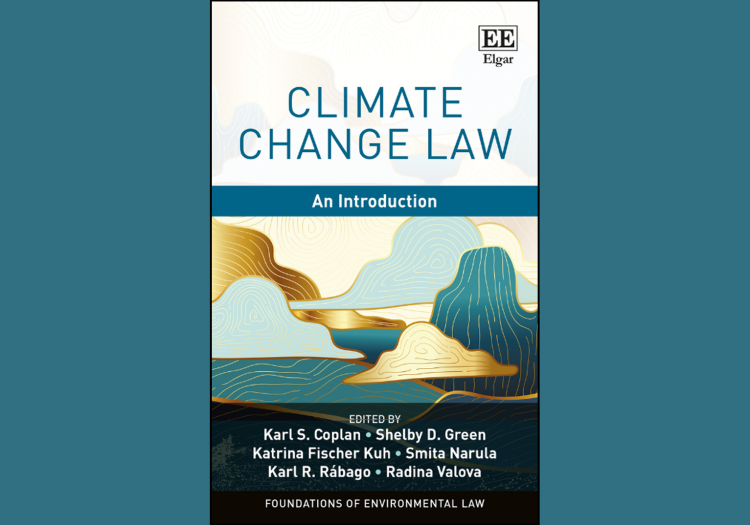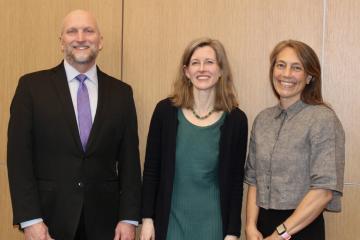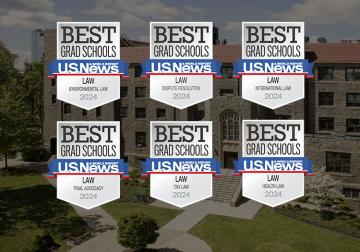Elisabeth Haub School of Law at Pace University Professors publish “Climate Change Law: An Introduction”

Elisabeth Haub School of Law at Pace University Professors Karl S. Coplan, Shelby D. Green, Katrina Fischer Kuh, Smita Narula, Karl R. Rábago (former professor), and Radina Valova, announce the release of their book “Climate Change Law: An Introduction" published by Edward Elgar Publishing. The book combines an introduction to the core legal and policy issues presented by climate change with a deeper analysis of decisions that will define the path forward. It offers a guide to key terms, concepts, and legal principles in the field, and was written to help readers develop a sophisticated perspective on issues central to climate change law and policy.
Professor Katrina Fischer Kuh explains that literacy in the law of climate change will empower lawyers, policymakers, and concerned citizens working to help respond to the climate emergency, and that the book scaffolds reader understanding, quickly introducing core legal terms and concepts to allow readers to understand the key legal debates and obstacles presently shaping society's mitigation efforts.
The authors used years of their research and experience to introduce readers to key terms, concepts, and legal principles in the field of climate change law. Climate change touches nearly every field of law. Since it is so trans-substantive, the authors discussed climate change law in numerous contexts, including international climate change treaties, climate mitigation, energy law, subnational climate adaptation, climate change litigation, international human rights law and climate change, private climate change actors, and individual ethics. After reading “Climate Change Law” the authors hope readers will be introduced to both the basics of climate change law and to current legal questions and debates. Professor Karl Coplan notes that the book is meant for lawyers, law students, policy makers, and climate activists who want an accessible introduction to the legal tools available to address climate change.
The primer is timely as climate change continues to impact public health, safety, and prosperity. Further, climate change law is all the more pressing in the context of a possible 4℃ temperature rise, which is about 2℃ higher than traditional predictions. “What I hope readers will take away from the book is that just as we have the technologies to address climate change, we have the policy tools to address climate change as well, and it is imperative that we put them to work,” said book co-author, Professor Karl Coplan. Professor Radina Valova notes, “[c]limate law is a vast subject area with many branches, each of which has its own legal, regulatory, and policy intricacies. I hope that readers will take away from this book an understanding of the fundamental legal and policy principles of climate change law, as well as future opportunities and challenges.”
The book has received critical acclaim by noted environmental law and climate change experts, including Michael B. Gerrard, Andrew Sabin Professor of Professional Practice, Founder and Director of Sabin Center for Climate Change Law at Columbia Law School, and renowned environmental lawyer. He noted that, “[b]oth lawyers and non-lawyers often ask me what to read for a concise introduction to the U.S. and international laws that are relevant to climate change. Now I have something to enthusiastically recommend. This book is a terrific primer on a complex and rapidly evolving area of law. It shows how courts, legislatures, and executives are addressing (or not) one of humanity's greatest challenges. Even experts will find it a useful refresher.”
Professor Katrina Fischer Kuh sat down for a question and answer series on the book. Watch it here.
About Elisabeth Haub School of Law
Elisabeth Haub School of Law at Pace University offers J.D. and Masters of Law degrees in both Environmental and International Law, as well as a Doctor of Juridical Science (SJD) in Environmental Law. The school, housed on the University’s campus in White Plains, N.Y., opened its doors in 1976 and has more than 9,000 alumni around the world. The school maintains a unique philosophy and approach to legal education that strikes an important balance between practice and theory. Haub Law launched its Environmental Law Program in 1978, and it has long been ranked among the world’s leading university programs, with a current #1 ranking by U.S. News & World Report. Pace’s doctoral graduates teach environmental law at universities around the world. Pace’s J.D. alumni are prominent in environmental law firms, agencies and non-profit organizations across the U.S. and abroad. In 2016, the Law School received a transformational gift from the family of Elisabeth Haub, in recognition of its outstanding environmental law programs. For more information about Haub Law, visit http://law.pace.edu



